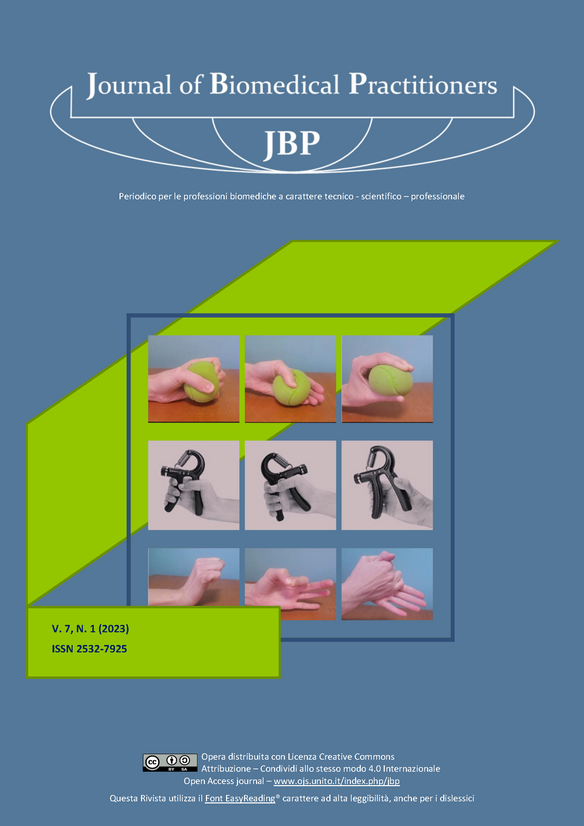Therapeutic adherence in people after Acute Coronary Syndrome: an observational study
Main Article Content
Abstract
INTRODUCTION
Acute coronary syndrome is one of the world’s leading causes of death. Poor adherence to post-IMA therapy can lead to re-hospitalization, increased health costs and poor prognosis. Medications are the best treatment to avoid new cardiovascular events and increase survival following coronary artery disease. The objective of the study is to identify the determinants of poor therapeutic adherence in a sample of patients in post-IMA follow-up in the department of Cardiology of the Hospital "Cardinal Massaia" in Asti.
MATERIALS AND METHODS
A questionnaire consisting of 33 items from the Moriski scale and the Brief Medication Questionnaire was administered by phone-centered interviews. The final score provided a data of therapeutic adherence (poor, average, total).
RESULTS
A sample of 184 follow-up patients were included in the study. The data show that 50% (92) of patients have forgotten at least once part of their drugs, 42% (77) do not know the drugs they take and their effects. 36% (66) of the sample evaluates the importance of drugs compared to their lives with a score of 9/10 and 27% (50) with a score of 10/10.
DISCUSSION
Adherence to therapy is a serious problem. From the comparison with literature, it seems that forgetfulness is the most representative parameter, along with fear for side effects and addiction.
CONCLUSIONS
Analysis of the causes showed that general misinformation is the main reason that leads to forgetfulness of therapy. Researchers, organizations, healthcare professionals and patient groups must work in close synergy to improve follow-up pathways and control the effects of fear of adverse reactions or addiction.
Downloads
Article Details
The authors agree to transfer the right of their publication to the Journal, simultaneously licensed under a Creative Commons License - Attribution that allows others to share the work indicating intellectual authorship and the first publication in this magazine.
References
[2] Zhang Y, Kaplan CM et al. Medication Adherence and Readmission in Medicare Myocardial Infarction. Am J Manag Care. 2014;20(11): e 498–505
[3] Osterberg L, Blaschke T. Adherence to medication. N Engl J Med. 2005;353(5):487-97
[4] Hamood H, Green MS et al. Determinants of adherence to evidence-based therapy after acute myocardial infarc-tion. Eur J Prev Cardiol. 2016. Vol. 23(9): 975–85
[5] Eindhoven DC, Hilt AD et al. Age and gender differences in medical adherence after myocardial infarction: Wom-en do not receive optimal treatment. Eur J Prev Cardiol. 2018;25(2):181-9
[6] Dibao-Dina C, Angoulvant D et al. Patients' adherence to optimal therapeutic, lifestyle and risk factors recom-mendations after myocardial infarction: Six years follow-up in primary care. PLoS One. 2018;13(9): e0202986
[7] Hussain S, Zahid-Jamal S et al. Medication adherence in post myocardial infarction patients. J Ayub Med Coll Abbottabad. 2018;30(4):552-7
[8] Lee YM, Kim RB et al. Relationships among medication adherence, lifestyle modification, and health-related quali-ty of life in patients with acute myocardial infarction: a cross-sectional study. Health Qual Life Outcomes. 2018;22;16(1):100
[9] Doll JA, Hellkamp AS et al. The association of pre- and posthospital medication adherence in myocardial infarc-tion patients. Am Heart J. 2019; 208:74-80
[10] Shang P, Zheng X et al. Association Between Medication Adherence and 1-Year Major Cardiovascular Adverse Events After Acute Myocardial Infarction in China. J Am Heart Assoc. 2019;8(9): e011793
[11] Pietrzykowski, Ł, Michalski P et al. Medication adherence and its determinants in patients after myocardial in-farction. Sci Rep. 2020;10(1):12

